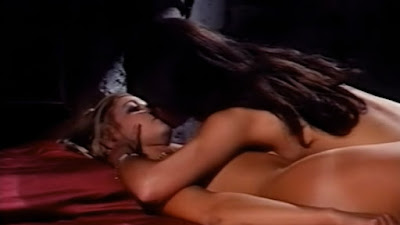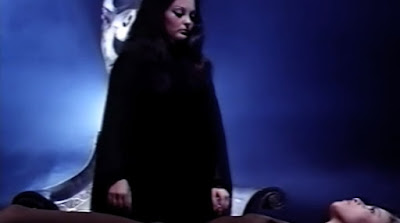“Thank Heaven! The crisis / The danger is past, and the lingering illness, is over at last /, and the fever called “Living” is conquered at last.” Edgar Allan Poe
Horror films are more traditionally associated with anxiety and sleepless nights. Funny, then, how we tend to look towards horror sometimes to wind down after the day. Now, I love to be scared and shocked just as much as any horror fan, but what about a horror film that can have the opposite effect, one that puts you to sleep through relaxation and comfort? Thanks to the usual languid pace and soothing dark ambiance, a lot of older gothic horror films can serve as a pretty good example of this, such as the gothic literary mashup Night of the Damned.
Directed by Filippo Walter Ratti and written by Aldo Marcovecchio, Night of the Damned is a quaint little ‘70s Italian gothic horror that hits a lot of the right notes when it comes to style, mood, and atmosphere. Sure, there is better to pick from, but something about this film made me want to revisit and connect with it on a deeper level. The Poe-inspired world is worth getting lost in, and it appeals to my love for the supernatural femme fatales who reign from their remote dark castles, with the occult and hedonistic rituals that usually accompany them.
This is somewhat familiar fare if you’ve been digging around vintage gothic Eurohorror for a while. You’ve probably seen most of this before, but I’m assuming you’re here because you also love this stuff and can’t get enough of it. It’s good for the collectors of this type of film, and, if you can bare a somewhat convoluted and slow narrative, there’s a considerable amount of enjoyment to be had as well, with beautifully dark visuals, a macabre meld of death and sex, and the lovely company of Patrizia Viotti (Death Falls Lightly, 1972) and Angela De Leo (Juliette de Sade, 1969). I will say though, with an effectively creepy interior castle being the common setting, the movie suffers a little for not having a single castle exterior establishing shot. I mean, there are brief glimpses of small portions of the castle when the leads arrive, but why not show the whole picture?
Night of the Damned fuses literary inspiration from Edgar Allan Poe’s The Fall of the House of Usher (1839) and Sheridan Le Fanu’s Carmilla (1872) and wraps it in the classic witch’s curse theme, topped off nicely with that 1970s gothic and erotic horror aesthetic. It starts out a bit like House of Usher, but in the 1970s, and eventually turns into Carmilla by way of Elizabeth Bathory. I like the result even if the movie is overall lacking a bit in the story and set piece department. The provocative, and not to mention fabulous, music with female vocals in the film, by Carlo Savina, is recycled from Amando de Ossorio’s Malenka (1969). I like it, and it does nicely fit here, too. I mostly recall it being used during the opening credits and closing scenes in both films.
Jean (Pierre Brice) and Danielle (Viotti) Duprey are a savory couple about to fall into some unsavory business. It’s established from a newspaper article that Jean Duprey is a lucrative journalist with a talent for exposing criminals. Turning down a personal phone call from the minister, Jean is apathetically relaxing on his couch, after his latest journalistic victory, and enjoying his tobacco pipe and comic cartoon strips while Daniele reads excerpts of praise to him from a newspaper. Downtime doesn’t last very long when you’re a man like Jean Duprey, because adventure calls in the form of a letter, with a royal seal, from a dear old friend of his, Prince Guillaume de Saint Lambert (Mario Carra). The letter contains a kind of poetic riddle with an encoded distress call from Guillaume. Jean must refer to his Charles Baudelaire poetry book, previously gifted to him from Guillaume, to decode the message with additional help from Danielle. Maybe something was lost in translation, but I tend to have a difficult time following along as Danielle and Jean ponder over the text and flip through the pages of the book, but what is gathered is that Guillaume could be in grave danger and likely needs Jean’s help. Why would Guillaume have to encode his distress call and not be more direct about it? I imagine it’s because his outgoing mail gets thoroughly screened, likely from someone in his own household.
The distress call works, because Jean and Danielle are off to visit/check-on Guillaume at his creepy castle that hasn’t seemed to change much since the Middle Ages. After arrival, they are met by a pretty but sketchy looking maid (Daniela D’Agostino) and Guillaume’s beautiful but sinister looking new wife Rita (Angelo De Leo), who alerts them that Guillaume is not well. (I love the way these kinds of horror castles always come with a stock maid, whose job here is to look suspicious in the background, while lurking around lighting candles. She might just be an innocent bystander. Come to think of it, she kind of vanishes from the movie at one point without really being accounted for.)
It's when Jean visits Guillaume in his room that the film starts to feel like The House of Usher suddenly. The conversation scenes between Jean and Guillaume are grim and depressing, with Guillaume in a frantic and weak state, mentally and physically, referring to a dreadful family curse. He alerts Jean that he has discovered a terrible secret in the old books and papers in the castle library, but his delirious state keeps him from clarifying specifically what he’s discovered. It isn’t difficult to guess that maybe Guillaume’s wife and the creepy doctor (Alessandro Tedeschi) she has treating him might also have something to do with what is happening to him.
Guillaume’s suffering eventually ends with his passing one night. His funeral procession that follows seems sinister, as it is conducted in a cult-like manner that does not seem to be honoring him but rather prepping him for something evil.
Eventually, after his death, Guillaume’s cousin and sister, despite being in remote locations hundreds of kilometers away from the castle, are mysteriously abducted, at different times, and fed to a deadly black mass orgy (the reinstated ritual orgy scenes are visually rough looking and probably could have been wilder, but they are still nice to behold). The orgies take place in some hidden smoke/fog-filled dungeon and are overlooked by none other than Guillaume’s evil widow, Rita, atop her throne. The following discovery of the dead bodies with their breasts clawed and their relation to the Saint Lambert family has detectives and Jean puzzled (a brief scene, where one of the bodies is discovered, was shot in the same hotel where Death Falls Lightly (1972) was also shot, which also starred Patrizia Viotti). Jean continues residing in the castle, utilizing the library to get to the bottom of what is happening. Ultimately, Danielle falls prey to Rita and her black masses. Will Jean defeat the evil witch and save his wife from the ravages of the lesbian orgy?
Night of the Damned somehow manages to deliver on a visual and thematic level. I like the gloomy looking environments and the inevitable feeling of doom. It has just about everything fans look for in this kind of genre film. With great cinematography from Girolamo La Rosa (Sex of the Witch, 1973), the interiors of the castle kind of give off the feel of an isolated world that I try to get lost in when watching the film.
When analyzing it, the story to Night of the Damned really isn’t bad; it probably could’ve been executed a little better. I guess it kind of fails as a mystery movie, since a mystery element is introduced and is heavily focused on, but it’s executed in a way that doesn’t really keep you interested and ends up not offering much in the way of originality or any real surprises. It doesn’t have the most inspired wrap up either, but it does suggest that the adventures of Jean Duprey may continue… Although, not if Danielle has any say in the matter.
I did like the small cast of characters and thought they were quite memorable. Alessandro Tedeschi has a creepy, unnerving, and dialogue-free role as a false doctor who doesn’t seem like he should be anywhere near poor Guillaume. Pierre Brice is not a bad lead, if a little bland. His lead role as the hero, Jean Duprey (a bit of a swap for Poe’s Dupin), ends up feeling more like a detective than a journalist. He is actually a good guy who doesn’t seem to make any mistakes. I would’ve preferred someone a little more flawed or amoral. It is a little annoying when he laughs at or dismisses Danielle’s nightmares and anxieties regarding the castle. It also seemed unnecessary for him to keep Danielle at the castle after Guillaume’s death, seeing as the place wasn’t good for her mental health. They nonetheless do seem to have a healthy marriage otherwise.
Angela De Leo’s role as the evocative Rita Lernod / Tarin Drole is another dark, visually bewitching villainess alongside the likes of roles by Rosalba Neri in The Devil’s Wedding Night (1973) or Anne Libert in A Virgin Among the Living Dead (1973). She’s like the witch versions of Carmilla and Elizabeth Bathory, who also has the soul-sucking sexual predatory characteristics of a lesbian succubus.
Aside from the light-hearted scenes at Jean and Danielle’s home that bookends the movie, Night of the Damned is one of the darkest and slowest Italian gothic horrors I’ve come across. It is quite subdued without much in the way of excitement. It slowly rolls on like a funeral procession, possibly a little too slow, even by Eurocult standards, as this one tends to drag at times, so many viewers might be relieved when everything is quickly wrapped up at the end. But if slow, moody horror doesn’t bore you too much and you really enjoy dreary gothic ambiance, then this one can also be relaxing, almost with an ASMR quality to it at times. So, if you are looking for something to watch before bed, then why not fall asleep to Night of the Damned.
© At the Mansion of Madness


















No comments:
Post a Comment